Wondering if container homes are legal in Maryland? Good news – Container Homes are LEGAL! In recent years, container homes have emerged as a unique and innovative alternative housing option.
These homes are essentially dwellings made from repurposed shipping containers, which are transformed into stylish and functional living spaces.
The growing popularity and interest in container homes have sparked curiosity among residents of Maryland. If you too have been captivated by the idea of living in a container home, it’s important to understand the legalities surrounding this unconventional form of housing in Maryland.
Table of Contents
Zoning Regulations

In Maryland, zoning regulations play a crucial role in determining the legality of container homes. Understanding these regulations is essential before considering container home construction.
Overview of Zoning Regulations in Maryland
Zoning regulations in Maryland are established by local jurisdictions to control land use and development.
These regulations divide areas into different zones, such as residential, commercial, or industrial, and govern what type of buildings can be constructed in each zone.
Therefore, container homes must comply with the zoning regulations of the specific area where they will be built or placed.
Read More on Are Container Homes Legal In India? Find Out The Facts
How Zoning Regulations Determine the Legality of Container Homes
While zoning regulations vary across different jurisdictions in Maryland, they generally consider factors such as building size, aesthetics, setbacks, and usage. These regulations are put in place to maintain the character and integrity of different neighborhoods.
When it comes to container homes, zoning regulations specifically address concerns related to their structure, appearance, and impact on surrounding properties.
Specific Restrictions and Requirements for Container Home Construction and Usage
Specific restrictions and requirements for container homes can include limitations on the size of the container home, exterior finishes, insulation standards, and setback requirements.
Some jurisdictions may also require the container home to be placed on a permanent foundation. Additionally, there may be restrictions on parking, height, and occupancy limits.
It is vital to research and understand these regulations before planning and constructing a container home in Maryland to ensure compliance.
Read More on Container Home Builders In Wisconsin – Affordable, Eco-friendly
Importance of Understanding Zoning Regulations
Before embarking on the construction of a container home, it is crucial to comprehend and adhere to the zoning regulations of the specific area. Failing to do so may result in fines, legal issues, or even the need to dismantle or relocate the container home.
By understanding the zoning regulations, individuals can assess whether their desired location allows container homes and what requirements need to be met for legal compliance.
Building Codes and Permits
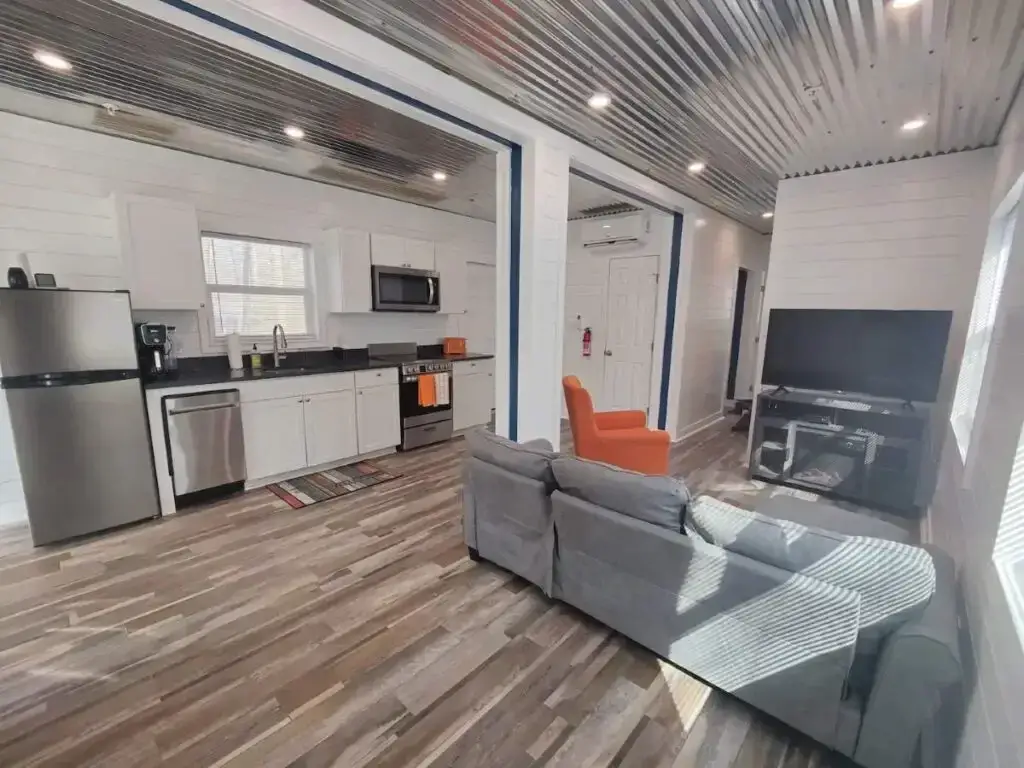
Compliance with local building codes is crucial when it comes to container homes in Maryland. The regulations and standards set forth by the local authorities ensure the safety and structural integrity of these unique housing options.
Importance of Compliance with Local Building Codes for Container Homes
Building codes are in place to protect residents and ensure that homes are constructed to withstand various environmental factors. For container homes, adherence to these codes is equally important to safeguard the occupants and the surrounding community.
By following the building codes, container homes are designed and built to meet specific safety standards. These standards cover aspects such as electrical, plumbing, ventilation, fire safety, and structural stability.
Read More on Container Homes In Central Florida: Affordable And Sustainable
Role of Permits in Container Home Construction or Remodeling
Permits play a vital role in container home construction or remodeling projects. They serve as official approval from the local government, ensuring that the necessary regulations are being followed.
Obtaining permits for container home projects involves submitting detailed plans and blueprints that meet the designated building codes. This process allows inspectors to review the proposed construction or remodeling project and verify that it complies with the required standards.
Safety and Structural Standards That Container Homes Must Meet
Container homes must meet specific safety and structural standards to ensure their durability and longevity. These standards include but are not limited to:
- Ensuring proper insulation and weatherproofing
- Complying with electrical and plumbing regulations
- Obtaining certificates for fire safety and smoke detection systems
- Structural reinforcement to withstand high winds and seismic activity
- Complying with load-bearing capacity requirements
Adhering to these standards not only ensures the safety of the residents but also helps mitigate potential risks associated with structural failures or maintenance issues.
Read More on Container Vegetable Gardening In Central Florida – Latest Ideas
Process of Obtaining Necessary Permits for Container Home Projects in Maryland
The process of obtaining permits for container home projects involves several steps:
- Research and familiarize yourself with local building codes and regulations specific to container homes in Maryland.
- Engage the services of an architect or container home specialist who can create detailed plans and blueprints that comply with the applicable standards.
- Submit the plans along with the necessary permit applications to the local building department or relevant authority.
- Pay the required permit fees and wait for the application to be reviewed.
- Schedule inspections as required during different stages of the construction or remodeling process.
- Once the project is completed and satisfies all the requirements, obtain a certificate of occupancy or final inspection approval.
It is essential to note that the process may vary depending on the specific jurisdiction within Maryland. Therefore, always consult with the local building department or professional experts to understand the precise requirements and procedures.
Read More on Florida Container Ports – Colossal Source of Used Containers
Local Government Policies
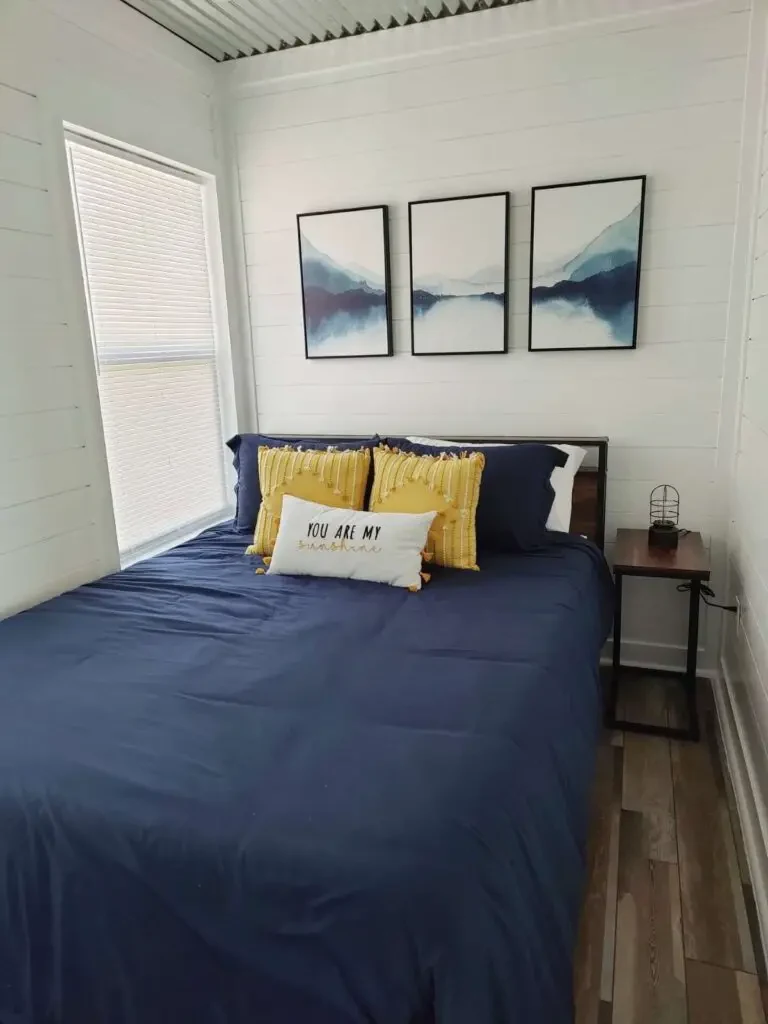
When it comes to container homes, local government policies in Maryland can vary significantly among municipalities. It is essential for prospective container homeowners to understand these policies before embarking on their construction journey.
Variation in Policies Regarding Container Homes Among Municipalities in Maryland
Each municipality in Maryland has the authority to establish its own regulations and zoning restrictions for container homes. This means that what may be legal or allowed in one jurisdiction may be prohibited or heavily regulated in another.
Examples of Jurisdictions with Different Regulations or Zoning Restrictions
For instance, some municipalities in Maryland may have specific guidelines and requirements for container homes, while others may not have any regulations in place.
It is crucial for individuals interested in container homes to thoroughly research the policies of their particular jurisdiction.
Consideration of Sustainability and Other Factors in Local Government Policies
Many local government policies in Maryland take various factors into consideration when regulating container homes. These factors may include sustainability, energy efficiency, and compatibility with the surrounding neighborhood. Some municipalities may have strict requirements regarding these factors, while others may be more lenient.
Read More on Container Home Builders In Houston – Discover The Best
Impact of Local Government Policies on the Legality of Container Homes in Maryland
Understanding local government policies is vital to determining the legality of container homes in Maryland. It is crucial to comply with all applicable regulations and obtain the necessary permits to ensure a smooth and legal construction process.
Homeowner Associations (HOAs)
When it comes to the legality of container homes in planned communities or neighborhoods, Homeowner Associations (HOAs) play a crucial role.
These organizations have the authority to enforce specific rules and covenants that may either permit or prohibit the usage of container homes.
Role of HOAs in Determining the Legality of Container Homes in Planned Communities or Neighborhoods
- HOAs have the power to set regulations and restrictions on construction and design within their jurisdiction.
- They may have pre-existing rules that explicitly prohibit container homes or any unconventional housing options.
- HOAs can also require homeowners to seek approval before making any modifications or building new structures, including container homes.
Specific Rules or Covenants That May Prohibit Maryland Container Home Usage
- Some HOAs may have guidelines that mandate traditional architectural styles in their communities, making container homes non-compliant.
- Restrictions on exterior materials or building materials may also affect the feasibility of container homes.
- HOAs may have rules regarding the size, setback requirements, or placement of structures, which might limit the ability to build container homes.
Case Studies of HOA Regulations and Their Impact on Container Home Legality
- Several planned communities within Maryland have faced legal battles and conflicts with HOAs due to their desire to build container homes.
- These case studies highlight the various challenges faced by homeowners seeking to establish container homes and the resistance they encounter from HOAs.
Strategies for Addressing HOA Restrictions or Seeking Approval for Container Homes
- Homeowners can engage in open communication with HOA board members and present their case for container homes, emphasizing the benefits and feasibility of such housing options.
- Seeking legal assistance to understand the rights and obligations of both homeowners and HOAs can also be helpful in navigating through the restriction process.
- Proposing compromises, such as adhering to certain design guidelines or conducting regular maintenance to ensure the aesthetics of the community, could increase the chances of obtaining HOA approval.
Read More on Are Container Homes Legal In Chicago? Exploring Possibilities
Architectural and Design Considerations
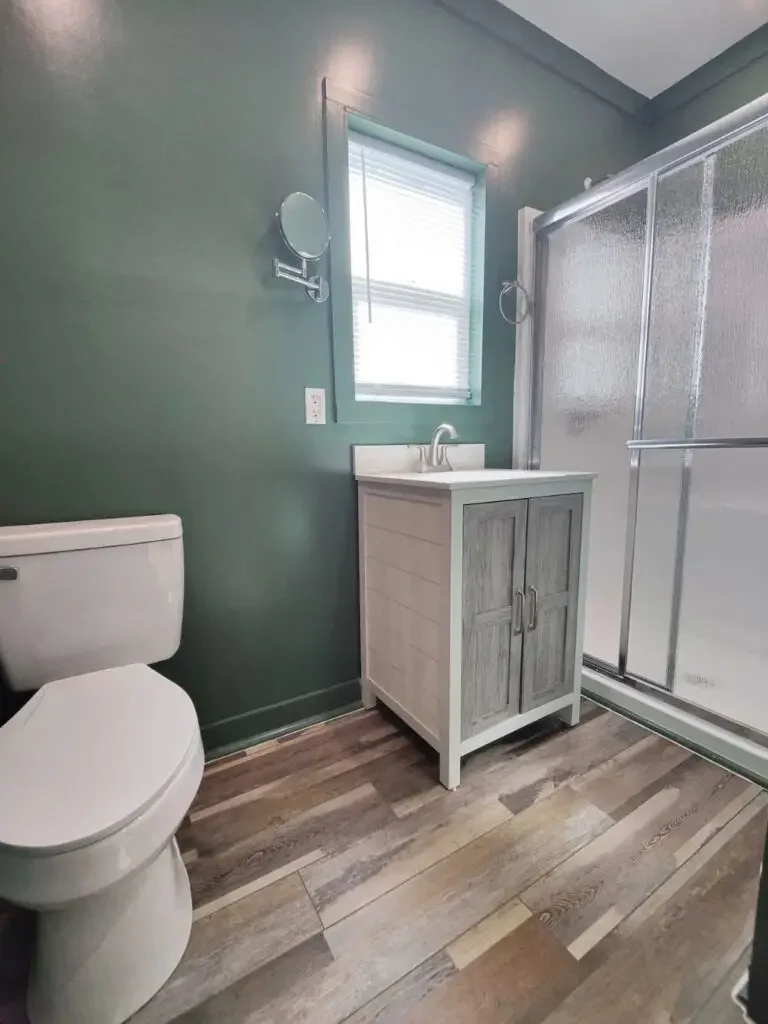
1. Importance of Aligning Container Home Designs with Local Architectural Guidelines
When building a container home in Maryland, it is crucial to ensure that the design aligns with local architectural guidelines.
These guidelines not only maintain the aesthetic integrity of the community but also regulate structural safety and compatibility with existing architectural styles. Failure to adhere to these guidelines can result in fines or even legal action.
2. Overview of Historic Preservation Requirements in Certain Areas of Maryland
In certain areas of Maryland, there may be additional requirements for container homes due to historic preservation efforts. These requirements aim to protect the historical significance of buildings and neighborhoods by preserving their architectural character.
It is important to research and understand these requirements before embarking on a container home project in such areas.
Read More on Are Container Homes Legal in BC? Interesting Review
3. Examples of Container Home Designs That Comply with Architectural Guidelines
Fortunately, there are numerous examples of container home designs that successfully comply with local architectural guidelines.
By working with an experienced architect or designer who specializes in container homes, you can create a unique and visually appealing dwelling that meets all the necessary requirements set forth by the local authorities.
4. Balancing Aesthetics and Functionality in Container Home Construction
Container homes offer a blend of modern aesthetics and functionality. However, it is important to strike a balance between the two during the construction process.
While prioritizing structural integrity, consider incorporating design elements that enhance the visual appeal of your container home. This can include integrating traditional materials, adding windows or skylights, and utilizing creative landscaping solutions.
Read More on Are Container Homes Legal In The UK? – Taboo Homes
Container Homes in Maryland Perceived Benefits and Concerns

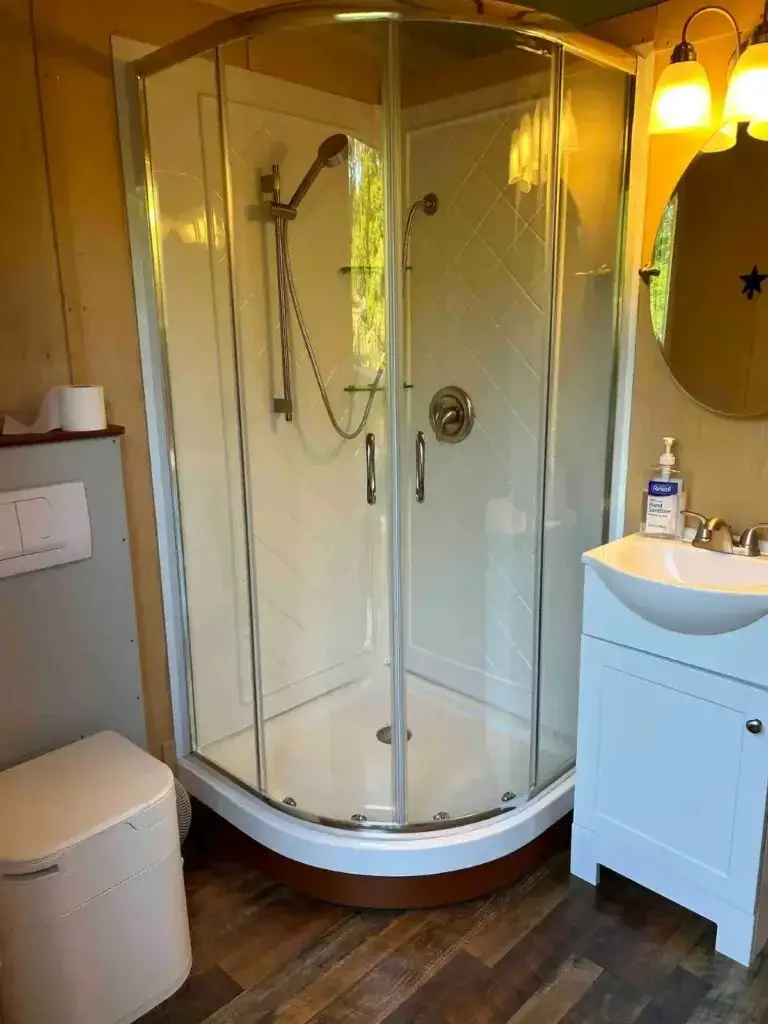
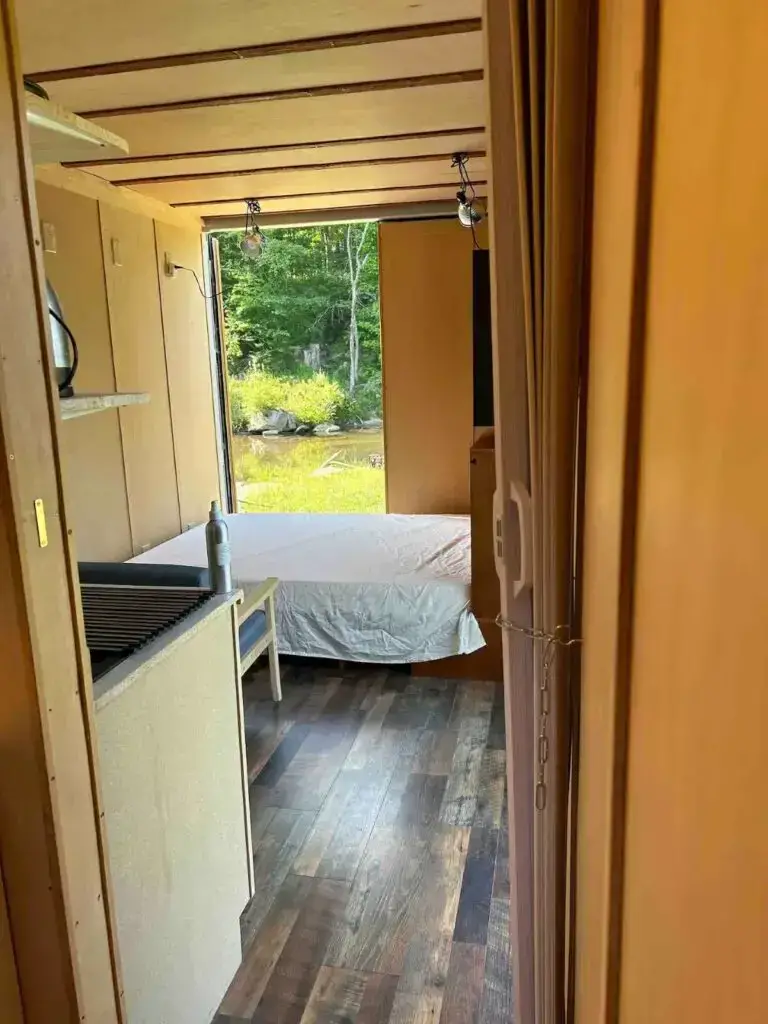
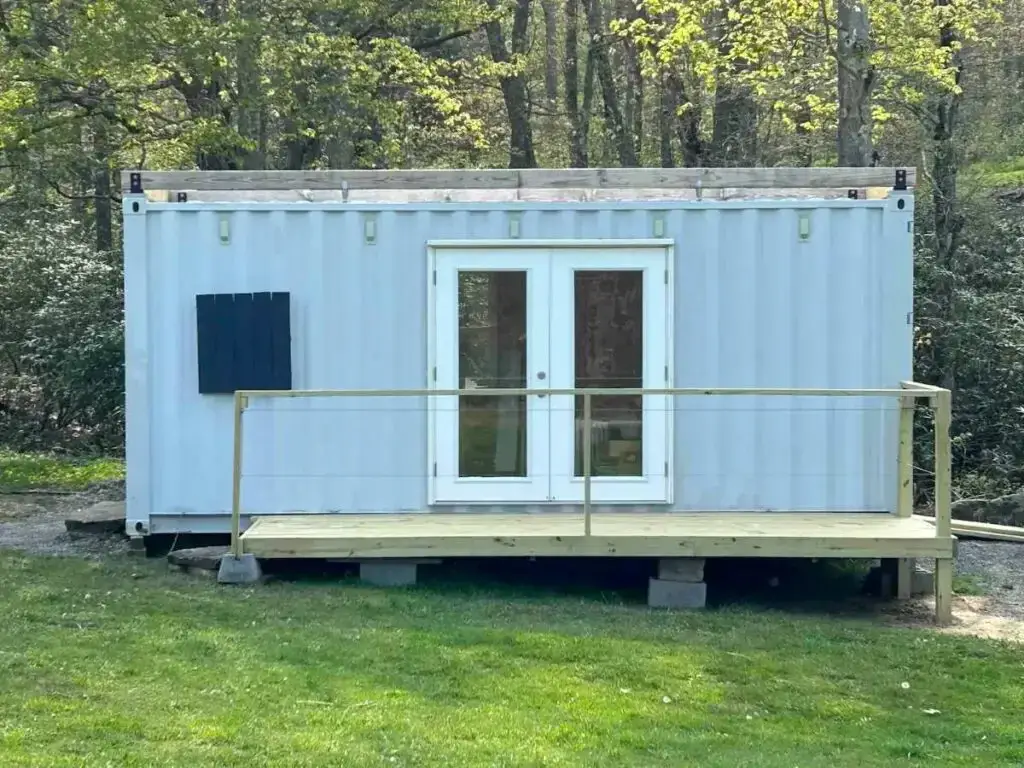
Container homes have gained popularity in Maryland due to their numerous benefits. Here, we discuss some of the advantages of choosing a container home:
Affordability
One of the major benefits of container homes is their affordability. Constructing a container home can be significantly cheaper compared to traditional homes, as the materials used are often more cost-effective. Additionally, recycling shipping containers helps reduce costs while minimizing environmental impact.
Sustainability
Container homes are an excellent choice for those looking to minimize their carbon footprint. By repurposing shipping containers, we reduce the demand for new construction materials, thus aiding in the conservation of natural resources.
Furthermore, container homes can incorporate eco-friendly features, such as solar panels and rainwater harvesting systems, promoting sustainable living.
Quick Construction Times
Container homes offer shorter construction times compared to traditional homes. The prefabricated nature of shipping containers allows for faster assembly, saving both time and labor costs.
This means you can move into your new container home sooner, enjoying the benefits of ownership without lengthy delays.
While container homes offer numerous benefits, it is essential to address some concerns that potential homeowners may have:
Structural Integrity
One concern regarding container homes is their structural integrity. It is crucial to work with experienced architects and contractors to ensure the containers are properly reinforced and that all necessary structural modifications are made. This will guarantee a safe and durable living space.
Read More on Container Home Builders in Virginia: Avoid The Unscrupulous
Energy Efficiency
Container homes may require additional insulation and energy-efficient systems to maintain comfortable living conditions. While containers are inherently sturdy, they may not possess the same level of insulation as traditional homes.
However, with proper insulation and the right choice of materials, container homes can be just as energy efficient as conventional houses.
Neighborhood Aesthetics
Another concern often raised is the impact container homes may have on the aesthetics of the neighborhood. However, with thoughtful design, container homes can blend harmoniously with their surroundings.
Working closely with architects and adhering to local guidelines can help alleviate concerns and ensure that the overall aesthetic appeal of the neighborhood is maintained.
By providing information on the benefits and addressing potential concerns, we aim to educate readers about container homes and empower them to make informed decisions.
Legal Precedents and Case Studies
As container homes continue to gain popularity in Maryland, it is crucial to understand the legal landscape surrounding them.
Researching legal precedents and case studies can provide valuable insights into past challenges and outcomes related to container homes in the state.
Importance of Researching Legal Precedents and Case Studies Related to Container Homes in Maryland
Before considering the construction of a container home, it is important to familiarize yourself with any legal precedents and case studies specific to Maryland. This research can offer a clearer understanding of the legal hurdles faced by container homeowners and the outcomes of previous legal battles.
By understanding the legal landscape, you can be better prepared to navigate the zoning regulations, building codes, and local government policies applicable to container homes in Maryland.
Read More on Container Home Builders in Washington – Affordable Homes
A Look Into Past Legal Challenges and Outcomes
Studying past legal challenges related to container homes in Maryland can provide valuable insights into the arguments, strategies, and outcomes of such cases. By examining the factors that led to legal disputes, you can identify potential pitfalls and learn how to proactively address them.
Furthermore, case studies can shed light on the specific issues raised by container homes, such as building code compliance, safety concerns, and neighborhood aesthetics. Understanding these challenges can help you develop a stronger case for the legality of your container home.
Potential Implications for Future Developments and Container Home Legality
Examining legal precedents and case studies can also provide clues about the potential implications for future container home developments in Maryland.
By analyzing the outcomes of previous cases, you can gauge how local government authorities and homeowner associations may respond to similar projects in the future.
Understanding the potential implications can help you make informed decisions regarding the design, location, and construction of your container home.
It can also provide you with insights into potential strategies for working with local government agencies and homeowner associations to ensure compliance and gain the necessary approvals.
Read More on Shipping Container Storm Shelter Cost: All You Need to Know
Potential Tax Implications
When considering the legal aspects of container homes in Maryland, it is important to take into account the potential tax implications that may arise. Property tax, appraisal, and tax assessment considerations are all factors that container homeowners should be aware of.
1. Property Tax, Appraisal, and Tax Assessment Considerations for Container Homes in Maryland:
- In Maryland, property taxes are based on the assessed value of the property.
- Container homes are subject to the same property tax regulations as traditional homes.
- Appraisal of container homes can vary depending on factors such as size, location, and condition.
- Tax assessments of container homes are typically conducted by local government authorities based on the market value of the property.
2. How Tax Implications Can Affect the Discussion on Maryland Container Home Legality
Tax implications can play a role in the overall legality of container homes in Maryland. If the property taxes on a container home are not paid or are improperly assessed, it could raise legal concerns and potentially jeopardize the legality of the home.
Additionally, homeowners may face challenges when it comes to obtaining financing for container homes due to the unique nature of these structures. Lenders may consider the potential tax implications and assess the risk involved in providing loans for container homes.
Read More on Best Shipping Container Paint – To Protect And Enhance
3. Resources for Further Information on Tax Implications for Container Homes
If you are considering a container home in Maryland, it is advisable to consult with a tax professional or local government authorities to fully understand the specific tax implications for your property.
Local government websites, tax assessment offices, and tax advisor associations are excellent sources of information for understanding the tax considerations associated with container homes in Maryland. These resources can provide valuable insights and guidance to ensure that you comply with all applicable tax laws and regulations.
Construction and Financing Options
When it comes to building container homes in Maryland, there are various construction and financing options to explore. Whether you already have a design in mind or need assistance in conceptualizing your container home, it’s crucial to consider these options before moving forward.
Construction Techniques Specific to Maryland Container Homes
Container homes offer unique construction techniques that differ from traditional homes. Understanding these techniques is essential to ensure the structural integrity and safety of your container home.
From customizing shipping containers to creating sustainable insulation solutions, working with experienced contractors who specialize in container homes can provide valuable insights into these techniques.
Contractors Specializing in Container Home Construction in Maryland
In Maryland, there are skilled contractors who focus specifically on container home construction. These professionals have the expertise to handle the complexities of creating a functional and aesthetically pleasing container home.
By partnering with a reputable contractor, you can ensure that your project adheres to local regulations and building codes while achieving the desired results.
Read More on Best Shipping Container Lock For Safe Transportation and Storage
Overview of Financing Options Available for Building Container Homes
Financing a container home project requires careful consideration of various options. Traditional mortgages may not cater specifically to container homes, so it’s important to explore alternative financing routes.
Some financial institutions offer specialized loans for container homes or innovative financing solutions tailored to sustainable and eco-friendly housing projects.
Importance of Considering Construction and Financing Options When Assessing Container Home Legality
While container homes are gaining popularity, it’s essential to thoroughly evaluate the construction and financing options available to ensure compliance with Maryland’s legal requirements.
Assessing these options early on can help you make informed decisions and avoid any potential legal issues in the future. Furthermore, determining the financial aspects of your container home project is crucial for budgeting and ensuring its feasibility.
Environmental Considerations
When it comes to container homes, there are several important environmental considerations that make them an attractive option for eco-conscious individuals in Maryland.
1. Sustainability Aspects
Container homes offer significant environmental benefits, such as reducing carbon footprint and increasing energy efficiency. The use of repurposed shipping containers reduces the demand for traditional building materials, minimizing deforestation and resource depletion.
Additionally, container homes can be designed with energy-efficient features, such as insulation and solar panels, further reducing their environmental impact.
Read More on Ultimate Truth On Is It Cheaper To Build A Container Home?
2. Use of Recycled Materials
A key advantage of container home construction is the use of recycled materials. By repurposing shipping containers, we reduce waste and promote a circular economy. Each container that is transformed into a home represents a significant reduction in waste ending up in landfills.
This sustainable approach to building helps preserve natural resources and improves the overall environmental sustainability of the construction industry.
3. Impact on Legal Acceptance
Environmental considerations play a significant role in the legal acceptance of container homes in Maryland. As the state continues to prioritize sustainability, container homes align with these goals.
By choosing container homes, individuals contribute to Maryland’s efforts to reduce carbon emissions and promote sustainable development. This alignment with environmental objectives increases the likelihood of legal acceptance and support for container homes within the state.
Read More on Solar Lease Vs Solar Financing: Which Is Better?
Conclusion
In conclusion, container homes are a unique and innovative housing option in Maryland. Throughout this content, we have explored various aspects related to the legality of these homes in the state.
Firstly, zoning regulations play a crucial role in determining the feasibility of container homes in different areas. It is important to understand the specific zoning requirements and restrictions before considering the construction of a container home.
Building codes and permits are another significant aspect to consider. Adhering to the appropriate building codes and obtaining necessary permits ensures that container homes meet the required safety standards and are legally compliant.
Local government policies and homeowner associations may have specific regulations regarding container homes. It is recommended to familiarize yourself with these policies and seek necessary approvals to avoid any potential conflicts.
Architectural and design considerations, including insulation, ventilation, and structural modifications, should be carefully addressed to ensure comfort and compliance with building standards.
While container homes offer numerous benefits such as cost-effectiveness and sustainability, concerns related to aesthetics and durability should also be taken into account.
Legal precedents and case studies provide valuable insights into the acceptance and legality of container homes in Maryland. Researching these cases can help you better understand potential legal challenges and the success of similar projects in the past.
Read More on How To Finance A Container Home: All You’ll Need
Consider Potential Tax, Financing, and Environmental Implications
Furthermore, it is essential to consider potential tax implications associated with owning a container home. Consulting with a professional tax advisor can provide you with accurate information regarding tax obligations and benefits.
Construction and financing options should be explored to determine the most suitable approach for building a container home. Researching different construction methods and financing solutions will help you make informed decisions.
Lastly, environmental considerations should not be overlooked. Container homes inherently offer eco-friendly advantages, such as recycling and efficient use of materials. Incorporating sustainable features and practices can further enhance the environmental benefits of container homes.
In conclusion, while container homes are a viable housing option in Maryland, it is crucial to thoroughly understand and comply with the legal requirements, building codes, and regulations specific to your area.
We encourage you to explore further resources and consult professionals, such as architects, builders, and lawyers, for specific legal guidance tailored to your circumstances.
Read More on Advantages And Disadvantages Of Solar Energy You Didn’t Know About

